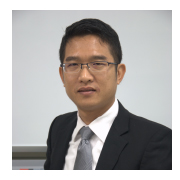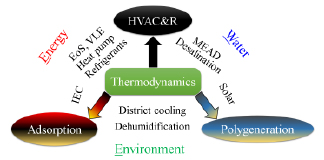Green and Efficient Systems for Water-Energy-Environment Nexus
熱エネルギー変換システム学研究室 チョー トゥ 准教授
Kyaw Thu

Industrial revolution together with advances in science and engineering has been providing the civilization with improved living standings and extended lifespan. It is now possible to defy the weather using heat pumps and to fight deadly bacterial/viral infection thanks to the advances in medicines. Meanwhile, Globalization and urbanization leads to the maldistribution of population and localized environmental issues such as urban heat island and severe water and soil pollution in metropolitan areas. As the living standard improves, so is the demand for the energy and electricity. However, the majority of the energy and electricity production is still by thermodynamic cycles such as power cycles and heat pump cycles. These thermodynamic cycles mostly reject heat to the ambient treating it a surrounding. Such a heat rejection is a mandatory for a cycle by the 2nd Law of Thermodynamics. Heat rejection and emission by the global-scale cause the ambient temperature rise while the global warming is one such example. On the other hand, the production of the commodities such as the cooling/heating energy and the potable will always be essential to the human species. Thus, it is important to develop thermodynamic systems that exploit the rejected energy from the upstream systems while generating essential commodities. Our research focuses on the low temperature heat-driven systems. The key areas are (1) adsorption and (2) polygeneration and (3) HVAC&R.

1. Adsorption We work on adsorption science; mainly adsorption thermodynamics such as the energetic, enthalpy and entropy of adsorbent + adsorbate systems; adsorption isotherms and kinetics. In application-wise, adsorption phenomenon is employed in pumping heat (cooling and heating), dehumidifying the outdoor air and turning sea or brackish water (adsorption desalination) to potable water.
2. Hybrid-desalination systems We have developed several hybrid desalination systems for improved performance. Examples are multi-effect adsorption desalination (MEAD) cycle, hybrid membrane distillation and adsorption desalination systems, and we work on the humidification-dehumidification desalination.
3. Polygeneration Polygeneration by cascading systems such as steam generation, absorption, adsorption offers high energy utilization factor (EUF). We employ entropy minimization technique to achieve an optimized system both in terms of efficiency and economic aspects.
4. Performance evaluation of low GWP refrigerants We are in the midst of refrigerant shortage. Next generation refrigerants need to have low GWP, low flammability, toxicity with high performance. Due to the lack of perfect pure refrigerants, mixtures become a norm while the evaluation of the thermophysical properties becomes more challenging. We work on thermophysical property measurement, the equation of states and the cycle performance tests using low GWP refrigerant mixtures.
5. Research tools We have extensive and basic experimental facility for adsorption characterization (mano and gravimetric techniques) and chiller performance test bed. We perform modeling and simulation in platforms such as ANSYS Fluent, COMSOL Multiphysics, Mathematica, C, FORTRAN, VBA and LabVIEW for control and DAQ.







